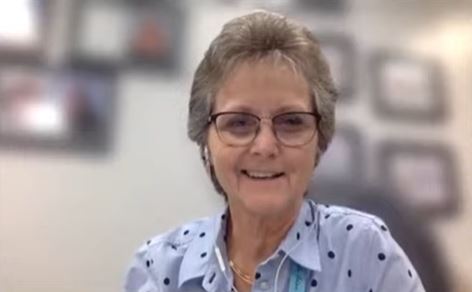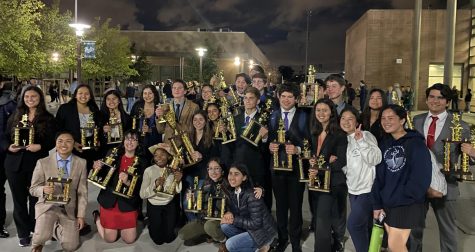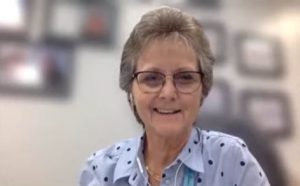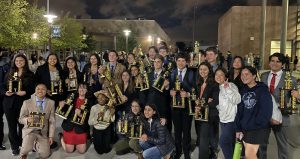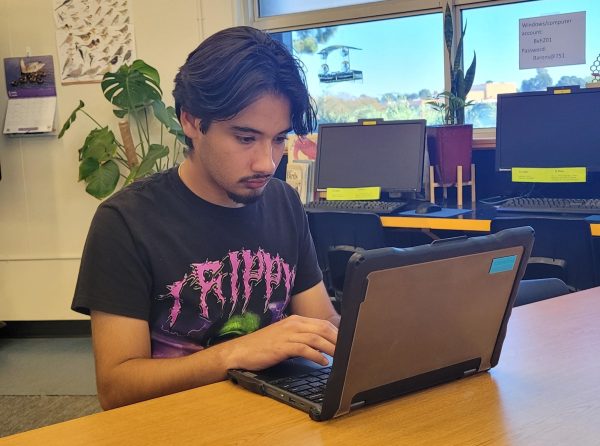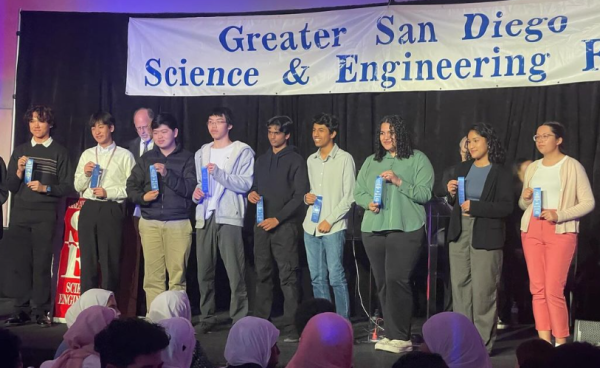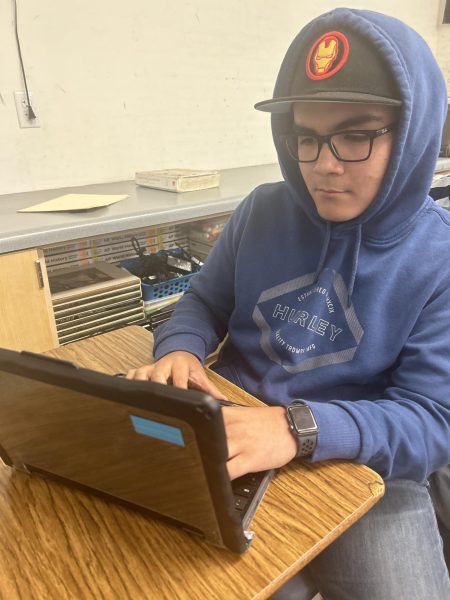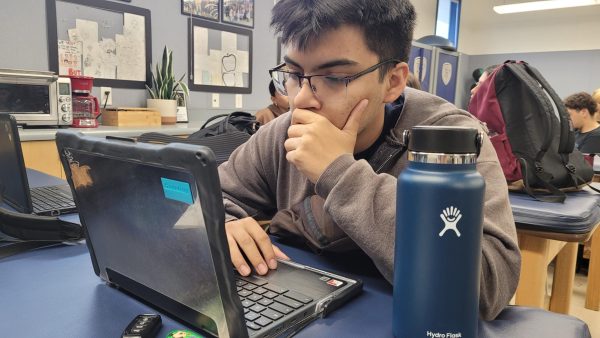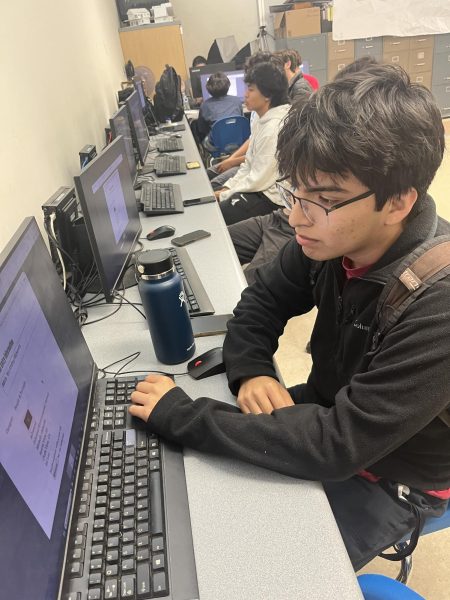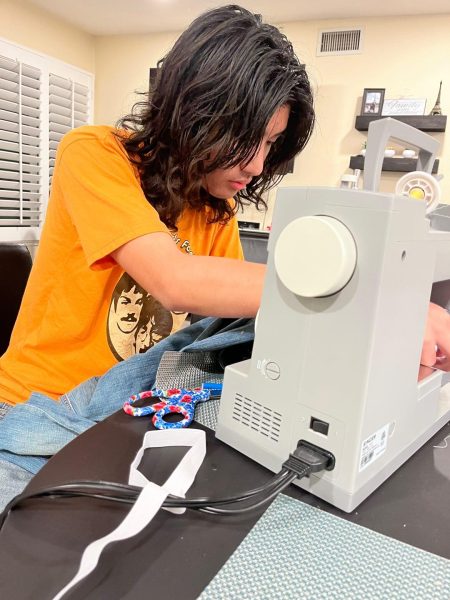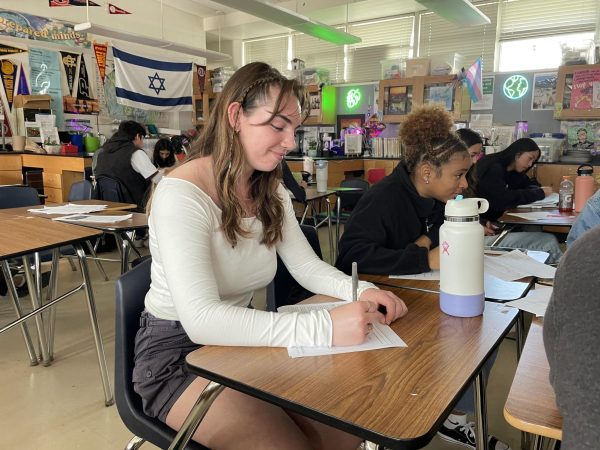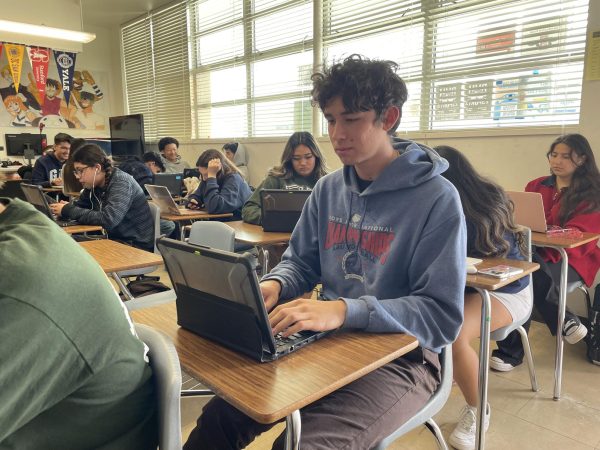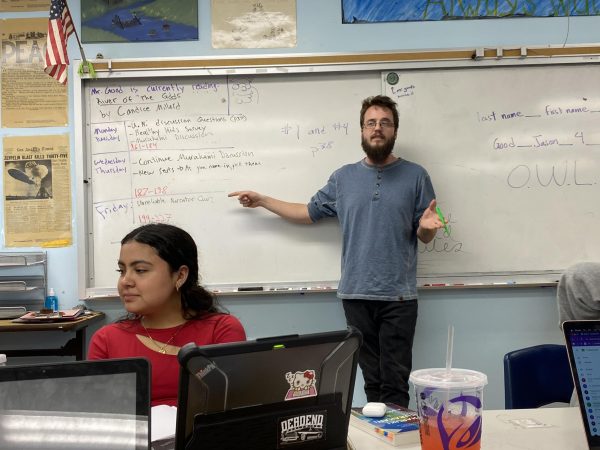“Sometimes I just need a hug”
Speech and Debate navigates loss of face-to-face connections amid pandemic
Speech and Debate officers take a light-hearted photo. Members of the team say easing the stress of competing is important for their mental health.
It’s a cold Saturday morning and a student wakes up at 7 a.m. shivering out of bed. They put on their formal attire. The computer is waiting on the desk. Chilly fingers glide across the keyboard as they try to to log into the Zoom meeting. Now, the competition begins.
This routine has become the new norm for Bonita Vista High’s (BVH) Speech and Debate team. The team was forced to make the difficult shift from attending in-person tournaments to ones hosted entirely online.
Speech and Debate has needed to rearrange the way in which they carry out tournaments and quickly adapt in order to ensure the success of the team. Accompanied by the assistance of Tabroom, a project of the National Speech and Debate Association and a tournament management system, utilizing the website has led to competitions running much more smoothly.
“The judges will get a ballot through Tabroom, and then [competitors] will go into a room [where a Zoom call is being hosted],” BVH Speech and Debate President and senior Ursula Neuner said. “It’s similar [to how it was run prior to the shutdown]. All the rooms are online, all the calls are online and then all the [tournament] results [are posted] online.”
The way each category of event is administered has changed dramatically as well. For instance, Speech and Debate has undergone numerous rule changes, which has forced competitors participating in the activity to alter how they compete.
“All the speeches are pre-recorded now. At a regular tournament, I would go up [to the front of the classroom] and do it live. [Personally], there is not as much pressure on me with online tournaments because all I do is film it once, [upload it to YouTube] and it just has to be perfect that one time,” BVH Speech and Debate Interpretive Event Captain and junior Abby Roman said.
Before the COVID-19 pandemic hit, many students who are part of the Speech and Debate team had the opportunity to be a part of the Speech, Communication and Theater seventh-period class. The class met everyday, providing the executive council a platform to teach students basic skills and lessons necessary to be successful in the activity. The team also hosted in-person, after school workshops every Tuesdays and Thursdays where students can get extra support, along with weekly lunch meetings on Mondays where officers notify students about announcements. Due to distance learning, Speech and Debate has reorganized this schedule and adapted to the ‘new normal.’
“It was difficult for us [team members] because we wanted to get in the same amount of instruction while also balancing that with trying not to get the team to spend too much time on their screens. We had to come to the realization that we can’t teach everything this year. We still have workshops afterschool on Tuesdays and Thursdays, but we’ve eliminated the Monday lunch meetings. Instead, we do quick announcements at the beginning of each workshop,” Neuner said.
In addition, Roman feels that the team as a whole has missed out on many learning opportunities. Typically, members of Speech and Debate would go to in-person class during seventh-period where students receive lectures about different events, how to practice memorizing speeches and write debate cases. Both Roman and Neuner describe that increased time for teaching and instruction for team members suffered a significant toll because of distance learning.
“Even though we check-in [in] the mornings with the rest of the team, it will never be the same. I feel like we’ve missed out on [opportunities to learn] about what we’re debating and different strategies,” Roman said.
However, not everyone shares the same sentiment when it comes to virtual competitions. International Baccalaureate (IB) English Higher Level (HL) 2 teacher and BVH Speech and Debate Coach Eric Helle said that he had “mixed feelings” on the team going virtual. Helle mainly voices his concern that the social element of Speech and Debate is challenging to mirror in distance learning.
“The act of trying to create a support system which enables students to do this rigorous activity is a challenge in itself. [In-person] tournaments used to be fun for kids because not only were they competing, but [they were] socializing with their peers, too. Those simple parts of the extracurricular have vanished during the pandemic. We try to reproduce that [in distance learning], but it’s difficult,” Helle said.
Roman and Neuner reaffirm Helle’s feelings of missing the social aspect of the activity. Regardless of the circumstances, they feel that being next to someone, talking, joking around and working together can never be replicated through a screen; it just isn’t the same. According to Neuner, the social component of the team is what motivates everyone to keep going but without that, a great threat has been posed to the team’s drive.
“The team aspect is what makes people stay in Speech and Debate. [Team members] stay [on the] team because it’s a competitive activity [that’ll] look good on college apps,” Neuner said. “However, when you take out [the social aspect within] the team, it’s so hard to stay. [The executive council] has to put in extra effort to remind members that we care about them.”
The Speech and Debate executive council is trying to deter the social void from overwhelming members of the team. In fact, the BVH Speech and Debate Historian, Laurinne Eugenio, has made efforts to maintain the social aspect of the team. The executive council has made it their goal to remind students to relax and de-emphasize the concept of winning in Speech and Debate.
“Laurinne Eugenio reached out [to her teammates] and said, ‘Hey, can you all send me a photo of you doing something silly?’ We [the executive council and Helle] were trying to brainstorm things that allow everyone to rediscover the part of Speech and Debate where it’s not only competition,” Helle said.

Unfortunately, socializing has not been the only obstacle that the Speech and Debate team has faced this past semester. Neuner describes that collaborating with teammates is much more difficult now because more team members are vulnerable to burnout and losing the motivation to persist throughout this troubling time.
“Not having that support system as much as we used to [is one of our biggest hurdles]. Lack of motivation is a really big barrier. Burnout is also a risk because competing at tournaments isn’t as fun and prepping by yourself in your room instead of in a workshop with the team isn’t as [enjoyable],” Neuner said.
Similarly, Roman comments that being disconnected from the team is taking a massive toll on her mental health. In Speech and Debate, a mentor/mentee system is established among the students. Officers, who take on the “mentor” role, are assigned to overlook a select few students, mentees. Mentors and mentees establish close relationships with one allowing officers to provide extra support for fellow team members by giving feedback on speeches or debate cases, helping them set goals, and maintaining communication with them. Roman misses celebrating or grieving with her mentees following a debate or speech tournament.
“That’s all we’re looking at—a screen. I just hate that feeling. I hate it. The pain of not seeing another human being during these competitions is immense. Sometimes I just need a hug from my mentees; it’s nice to get that hug. After a long tournament, I don’t have that anymore. All you have is a voice on the other line saying ‘Hey, I’m really proud of you’ But it’s not the same,” Roman said.
That’s all we’re looking at—a screen. I just hate that feeling. I hate it. The pain of not seeing another human being during these competitions is immense. Sometimes I just need a hug from my mentees; it’s nice to get that hug. After a long tournament, I don’t have that anymore. All you have is a voice on the other line saying ‘Hey, I’m really proud of you’ But it’s not the same.
— Abby Roman
In order to replicate the social experience in Speech and Debate, breakout rooms are created within workshops in order to more effectively engage the students. What the executive council and Helle aim to do is take a large group of people and split them up into smaller sections; this way it is easier for them to receive support because accommodating everyone in a bigger classroom setting is challenging.
“Oftentimes, we’re successful at it [supporting students] too. I do have the fortune of [having] a phenomenal executive council who will sacrifice their time to help their teammates,” Helle said.
Overall, Helle reassures everyone in Speech and Debate that they don’t have to fight the problems the pandemic poses alone. He furthers by saying that everyone involved in Speech and Debate are facing various issues, and ultimately, Helle describes that they can conquer and overcome these obstacles together, as a team.
“Real work isn’t done in isolation—it’s done in collaboration,” Helle said.
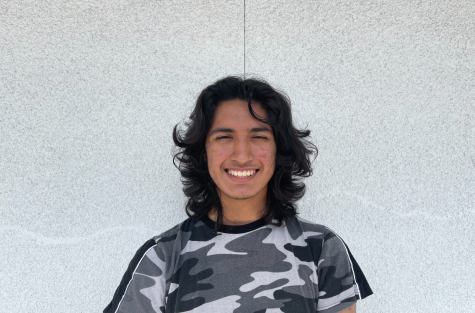
I am a senior at Bonita Vista High School and this is my second year on staff. I joined newspaper in order to achieve my full potential with my writing...



